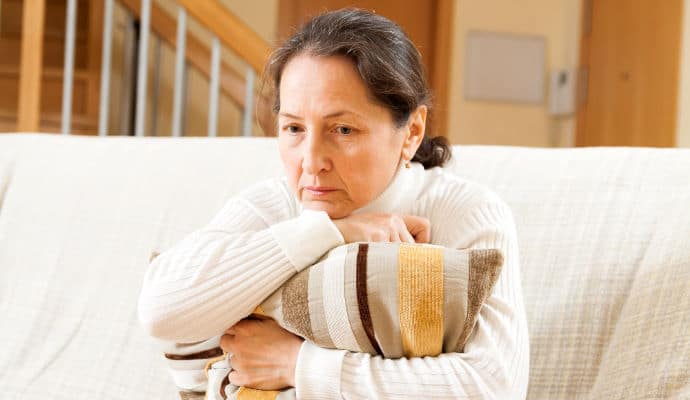
Many older adults go through major life changes that could make them more vulnerable to depression. But it’s heartbreaking to stand by and watch someone deal with depression or loneliness on their own. Zara Lewis shares 10 ways you can help your older adult cope with symptoms and improve their quality of life.
According to WHO estimates, depression affects about 280 million people of all ages worldwide.
While coping with depression is tough, it’s even more difficult to watch an aging family member struggle with it.
As my depressed mother-in-law’s caregiver, I’ve come up with a list of tips I wish to share with other caregivers to make it easier for them to help their older adult deal with isolation and depression.

1. Treat sleeping problems
Many older adults who live alone are prone to sleeping problems which can aggravate depression.
To prevent serious depressive episodes, see to it that the older adult keeps a regular sleep schedule and doesn’t take daytime naps.
If the person suffers from sundowning or sleep disorder, keep engaging activities or necessary medication close at hand.
2. Promote a sense of purpose
Struggle with depression is much tougher for people who’ve lost their sense of purpose in life.
To keep loneliness and brooding at bay, encourage the older adult to take up a hobby such as knitting or gardening.
You can also encourage them to try social pastime activities such as card playing, yoga, or volunteer work for a local charity.
3. Encourage social interaction
Don’t let your loved one deal with depression on their own: encourage them to visit friends and extended family, take part in group outings, and attend community events.
Studies suggest that an active social life improves physical, mental, and emotional health, which are especially important for the elderly struggling with loneliness and depression.
4. Keep them physically active
Research found that physical activity can be a lifesaver for aging persons.
Gentle exercises such as walking, stair climbing, and age-appropriate workouts can help an older adult stay in solid physical, mental, and emotional shape.
You can also encourage the depressed person to sign up for a group exercise class like yoga or tai chi – they might even make friends with like-minded peers.

5. Make sure they eat healthy
Help the depressed person to maintain a healthy diet.
Focus on fresh fruits, vegetables, whole grains, and fat-free or low-fat milk and milk products.
Include a variety of proteins like seafood, lean meats and poultry, eggs, legumes (beans and peas), soy products, nuts, and seeds.
And reduce foods with added sugars, sodium, saturated fats, trans fats, and cholesterol.
6. Entrust them with a chore
Older adults who live alone often get caught up in a whirlwind of negative thinking. It would be great if you could entrust them with a meaningful responsibility.
For people who are mobile, a dog will make a perfect companion that will make them feel loved and needed, keep them physically active, and serve as a social lubricant.
I’ve found caring for a plant can also be a potent mood-booster: my mother-in-law’s depression has improved since I bought her a moringa tree to look after.
7. Show them they’re loved
Love makes the world go round, and it can help keep an older adult’s depression under control.
Show aging older adults that you love and need them, listen to them, and hug them often.
Expressions of love are especially important for someone who is widowed and might need more support and affection to deal with grief.

8. Seek professional help
Decreases in appetite and behavioral changes can be a symptom of depression getting worse.
Contact a mental health professional and sign them up for counseling if you suspect the disorder is getting out of hand.
The therapist may recommend antidepressants, but in less serious cases, alternative medicine like aromatherapy or occupational therapy may be a better option.
9. Keep an eye on pills
In case your depressed family member is using antidepressants, you should make sure they take medications regularly and follow the doctor’s orders in terms of dosage, lifestyle, and diet.
You may also need to help manage medication. Remind them to take their daily dose and watch the medicine cabinet for signs of abuse or skipped doses.
10. Consider home care
For older adults who are living independently, you can hire someone to check on them daily and help with day-to-day chores such as grocery shopping and bathing.
Until I convinced my mother-in-law to move in with us, she’d been on full-time home care in San Francisco. Though it was a temporary solution, it made traveling over the holidays far less stressful knowing that she was in good hands.
Recommended for you:
- 3 Top Benefits of a Daily Routine for Seniors
- 5 Ways to Improve Quality of Life for Seniors
- Seniors Losing Interest in Life: 7 Ways to Help With Anhedonia
Guest contributor: Zara Lewis is a mom, fitness & yoga enthusiast, caregiver to her mother in-law and a regular writer for High Style Life. She is devoted to implementing healthy life habits in every aspect of life of her family and friends. She loves to share her parenting tips and is always open to learning some new skills, because she sees her parenthood as going to school forever. She enjoys traveling, hiking, cycling and baking.
Images: Vegan.eu, A Banyan Residence, Castle Senior Living
About the Author

Connie Chow
Connie was a hands-on caregiver for her grandmother for 20 years. (Grandma made it to 101 years old!) She knows how challenging, overwhelming, and all-consuming caring for an older adult can be. She also knows how important support is — especially in the form of practical solutions, valuable resources, and self-care tips.





last year three of my beloved pets died, they were all seniors themselves, one had cancer, the other two only minor ailments, but they were in good health overall, even my dog with cancer. Their deaths were shocking, sudden and I knew I was going to grieve so I allowed myself to do just that. My family understood but we are all far apart now. What surprised me the most was that my niece was so startled by the depth of my grief. I told there is a time for everything and a season for every purpose under Heaven ( from Ecclesiastes) and it was my time to grieve. The grief has passed but I make every effort to keep active, learn new things and if I need to cry I do! Depression can sneak upon anybody, but if it doesn’t have a cause, check out medical conditions, those often have depression as a sign of physical illness, for example low thyroid functioning, or if it is constant there needs to be medical intervention. I am a senior, but an active one and now I watch carefully for signs of returning depression. All the tips listed here help but I find that good routines help the most, especially activities that get me out into the sunshine. Having something to look forward to, even if it is a small activity is enjoyable and so easy to achieve. My health care provider wanted me to attend a chronic disease management class but I declined explaining I had plans for another more interesting activity, bird watching! I do have a chronic disease, it is well managed and I am normally symptom free, focusing on being sick all the time is a sure fire avenue to depression! No thanks!
It’s wonderful that you’ve found such amazing, positive ways to stay active and able to enjoy life. We’re so sorry for the loss of your beloved pets. It’s great that you allowed yourself plenty of time to grieve the loss and then took steps to build a healthy routine that you enjoy. Thank you for sharing your experience and excellent suggestions!